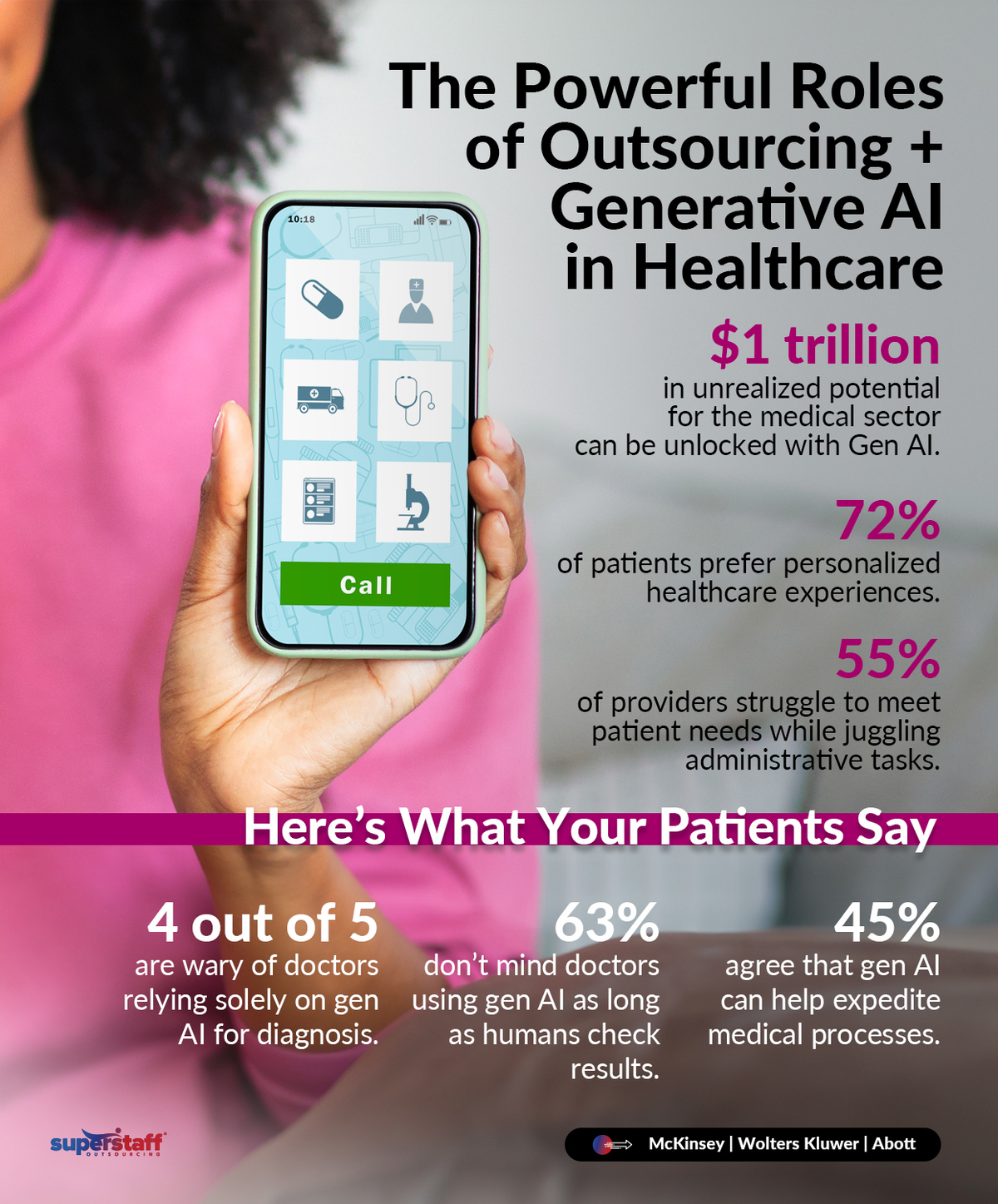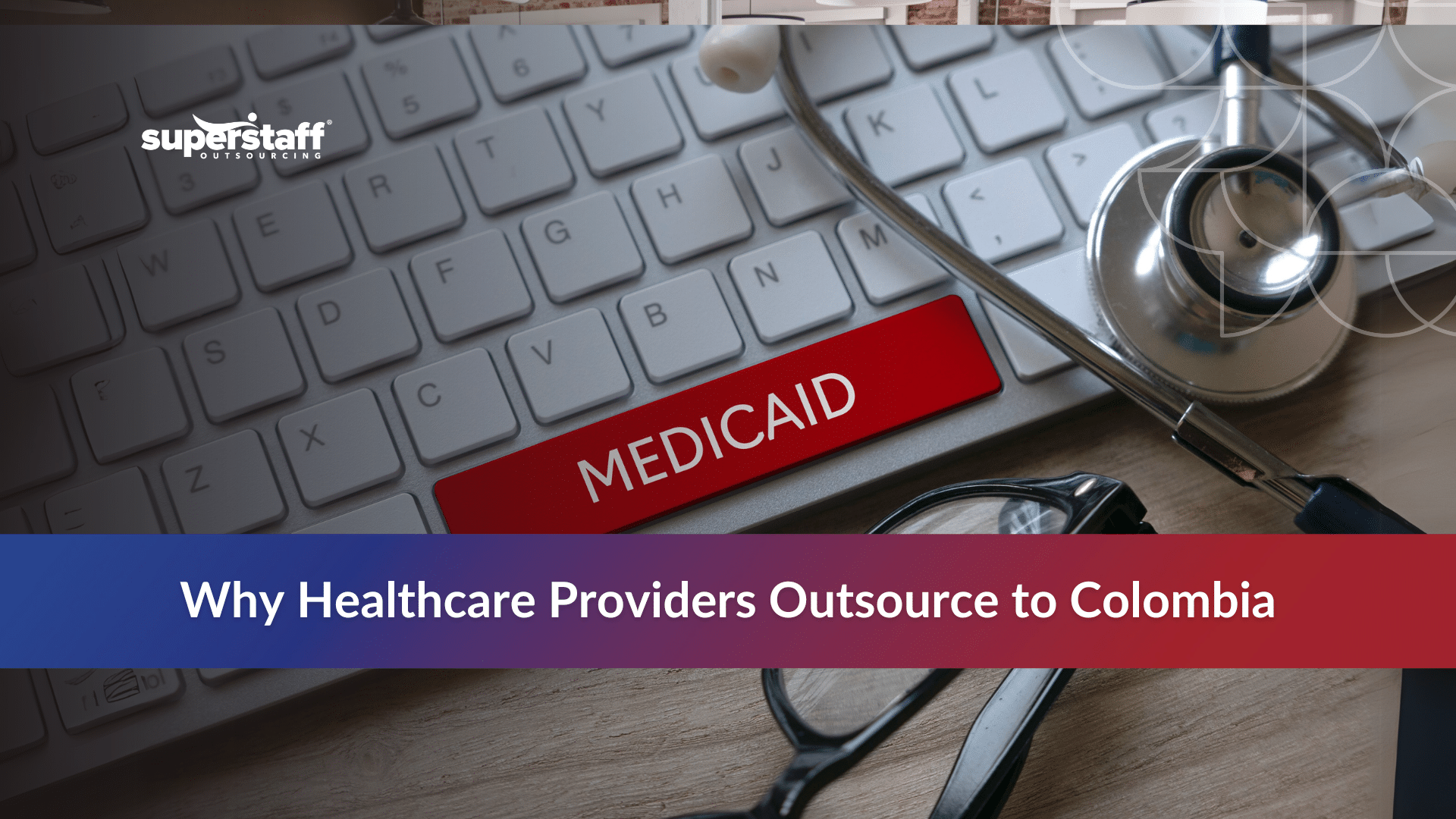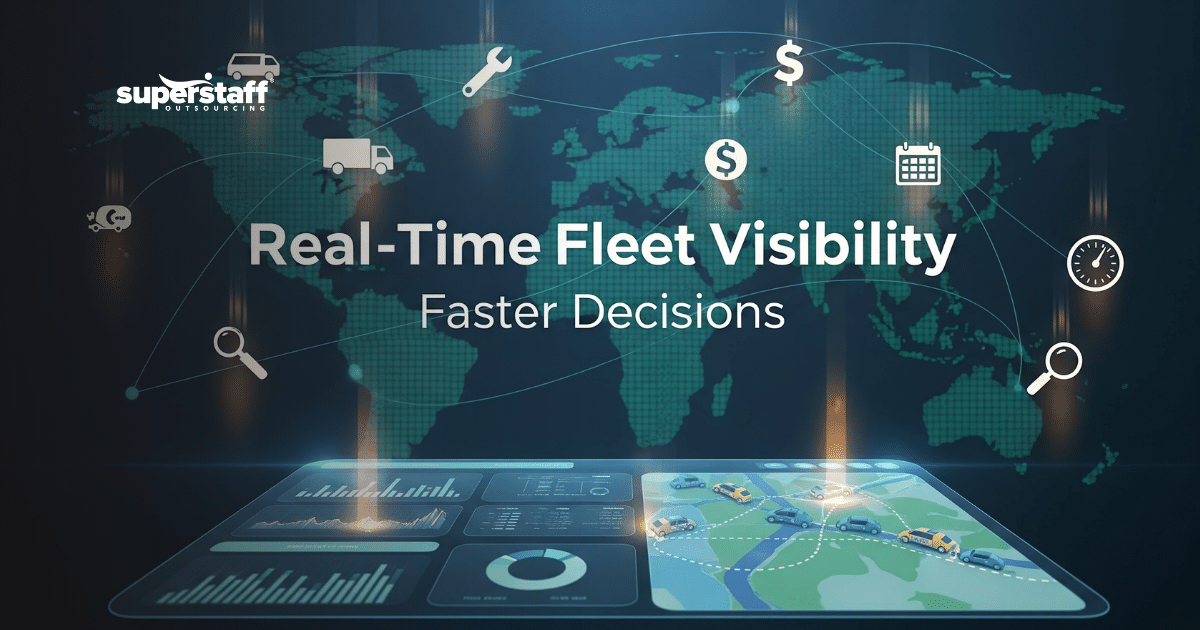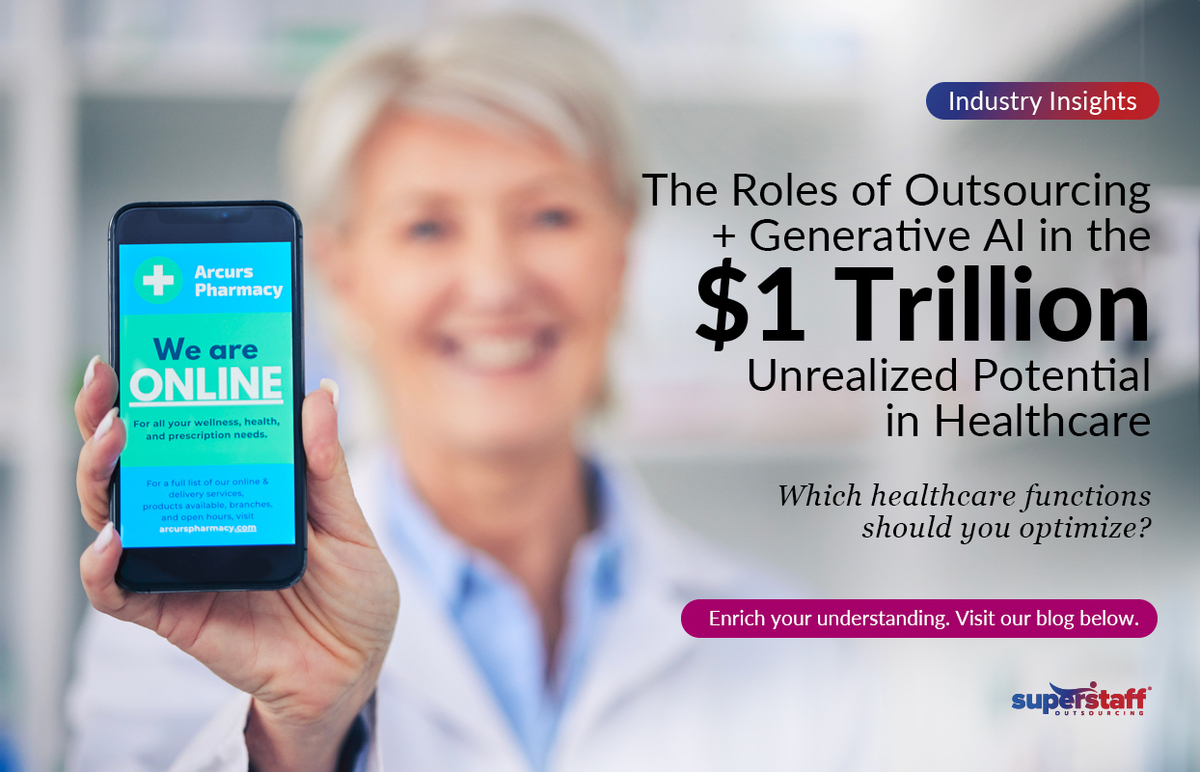
Artificial intelligence is more than just a buzzword; It’s a piece of technology with immense potential to revolutionize your healthcare operations. In the past, medical institutions like yours have already used AI technology to optimize operating room schedules and predict adverse events during treatments and procedures.
Today, with the rise of generative AI, you can unlock a transformative tool that can modernize your systems and streamline your processes rapidly. However, keep in mind that you must recognize the human element of your operations.
Top-notch patient care requires a human touch that even the most advanced artificial intelligence tools cannot yet provide. By blending healthcare BPO services with the latest technological advances, you can upgrade your systems and processes, ultimately unlocking over $1 trillion in unrealized potential for your industry.
Quick Overview: What Is Generative AI and Its Role in Healthcare?
Generative AI, or gen AI, is an artificial intelligence tool designed to generate content based on existing information and data patterns. Although this technology can be used in different fields, it is a particularly transformative innovation for the healthcare industry. A recent McKinsey study estimated that the medical sector could unlock over $1 trillion in unrealized potential by leveraging generative AI.
As a sector that deals with massive amounts of data scattered across multiple sources, healthcare institutions like yours can harness generative AI to turn mountains of raw information into usable assets. With the right gen AI strategy in place, you can improve processes, making your staff’s daily work lives more manageable and creating better patient experiences.
Do Patients Trust Generative AI?
According to a 2024 Wolters Kluwer survey, patients expect generative AI to become a standard part of their healthcare experience eventually. About 20% believe gen AI will become commonplace within the next two years, while 24% foresee it happening in the next three to five years.
More than half of American patients (52%) say they would feel reassured and confident in their diagnosis and results if they learned their provider uses generative AI. Most patients expressed fear and concern about gen AI, but many (45%) are also curious about its potential.
The insight above shows that generative AI has the potential to revolutionize the healthcare industry. However, patients don’t want you to rely solely on AI for all aspects of their care. They want you and their other chosen medical providers to add a human touch to every interaction as much as possible.
Here’s your biggest takeaway: Integrating gen AI into your workflow can give you a competitive edge, but you cannot overlook your patients’ fears and concerns about the technology. Take a holistic approach to enhancing patient care by combining generative AI with human excellence. This is where a specialty healthcare BPO can come in handy.
How Healthcare Outsourcing and Generative AI Can Enhance Each Other’s Functions
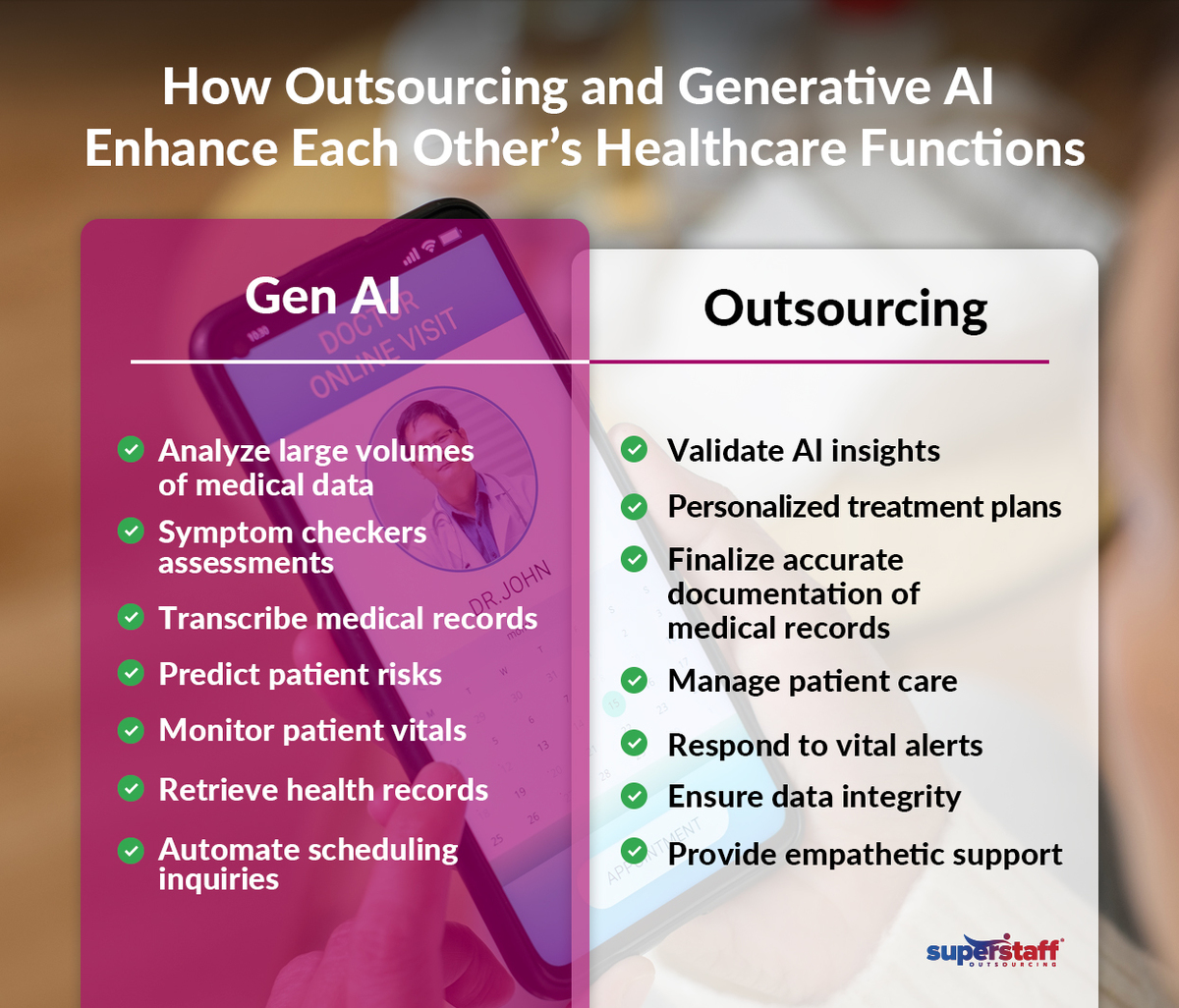
The healthcare industry is facing widespread worker shortages. In fact, the World Health Organization estimates that the current number of health workers worldwide is insufficient to handle the rising demand for medical services. By 2030, the sector may face a deficit of over 10 million healthcare providers.
At the same time, a majority of patients (72%) demand more personalized healthcare experiences. The primary challenge providers face (55%) is having enough time to cater to their patient’s needs while juggling other responsibilities.
The good news is that combining technology with human service can bridge the gap between what healthcare providers like you can offer and what patients expect. Outsourcing can address the ongoing healthcare labor crisis while strengthening and supporting your optimized medical processes.
Here are the particular healthcare functions that would benefit most from being optimized by the outsourcing + gen AI combination:
Medical Analysis and Interpretation
One area where generative AI can significantly help you is analyzing cases and assisting you in diagnosing patients. You can simply input patients’ symptoms into the generative AI tool and quickly receive a list of possible diagnoses.
Here’s the catch: The Wolters Kluwer survey mentioned above found that 4 out of 5 Americans would be wary of their doctors relying on Gen AI in their diagnosis or examination. However, 63% would be more open to providers using this tool if clinicians and other medical professionals created the data and the software was constantly updated for accuracy and reliability.
These numbers illustrate the importance of the human element in fostering patient trust and supporting positive experiences. Healthcare institutions like yours can use generative AI to process large volumes of medical data, identifying patterns and trends in minutes. However, you will still need human specialists to validate the accuracy and reliability of the AI’s findings and make clinical decisions without relying on only one source.
In the same study, 45% of patients agreed that gen AI can expedite healthcare processes by interpreting X-rays, medical tests, and images. As long as all diagnoses are reviewed by your healthcare specialists afterward, patients are fine with you using these advanced tools.
Telemedicine and Virtual Consultations
In addition to being beneficial for diagnostics and medical analysis, generative AI can also be useful for telemedicine solutions. With the rising demand for telehealth and telemedicine, the number of patient touchpoints involving AI has grown alongside it.
Today, you can utilize gen AI and machine learning (ML) tools to monitor patients remotely, taking in and analyzing vital signs and helping you spot unusual signs or symptoms. Patients can download AI-enabled applications on their smartwatches or smartphones that can help them monitor and collect data about their blood pressure, heartbeats, or glucose levels, which they then share with you.
During telehealth consultations, you can use generative AI to conduct preliminary assessments using the symptoms and data provided by patients, helping you quickly pinpoint the root cause of the problem. AI-enabled telehealth applications can also deliver real-time insights, potentially mimicking an in-person doctor’s visit.
However, despite the widespread use of AI for remote patient monitoring, ensure you and your human medical professionals still have the final say in a patient’s diagnosis and treatment plans. Gen AI can be useful for detecting patterns and helping providers rule out possibilities and outcomes. Still, your human specialists are needed for detailed and individualized care specific to the patient’s needs.
Clinical Documentation
Clinical documentation is another essential healthcare function that would benefit from generative AI optimization. Administrative workloads contribute significantly to medical practitioner burnout, leading to higher resignation rates among clinicians and lowering the quality of care for patients.
According to a 2024 survey, over 90% of doctors feel burned out because of all the paperwork they are expected to complete. Many (60%) even work an additional 15 hours per week outside their regular hours to keep up with the mountains of documentation.
To address this problem, many healthcare institutions like yours have begun investing in generative AI technology to assist practitioners with their administrative workload. One example is Microsoft’s DAX Copilot, an AI-powered documentation tool that allows doctors to record patient visits consensually and automatically transforms the conversation into clinical notes and summaries.
Instead of taking notes during an appointment, your doctors can focus on listening to their patients, building rapport, and creating meaningful connections. The AI-enabled technology can save several minutes per encounter while enhancing patient experiences.
Although these clinical documentation tools are helpful, the AI can still make mistakes when transcribing audio. Your human specialists must still check the notes and verify the data and information. After the AI tool creates the rough draft, a healthcare BPO can connect you with outsourced medical transcription professionals who can review and finalize the documentation to ensure accuracy and compliance.
Predictive Analytics for Patient Outcomes
Once data has been collected and organized, you can use the raw information for predictive analytics. In the healthcare industry, predictive analytics can collate patient datasets and anticipate the likelihood of certain diseases based on specific factors. Current research shows that generative AI has the potential to detect conditions that have been traditionally difficult to diagnose, such as rare hereditary diseases.
In addition to evaluating a patient’s family health history, AI-enabled tools can assess non-biological factors, such as lifestyle choices, physical activity, eating habits, and environmental effects. Medical experts estimate that a patient’s health outcomes are influenced more by behavior (40% to 50%) than genetics (30%) and their physical environment (20%).
Advanced AI models can combine all three factors when assessing an individual’s health outcomes, giving your physicians a 360-degree view of the patient and assisting them in creating a comprehensive treatment plan. Leveraging this technology can also help reduce biases when it comes to treating racial minority groups and other underprivileged communities.
Make sure to leverage predictive analytics to your advantage, using data-driven insights to make tough decisions when mapping out a patient’s treatment plan. However, to ensure the accuracy and reliability of the AI’s predictions, the best course of action is to work with an outsourced data science professional. These specialists can review and verify the AI’s forecast and reports, helping your doctors tailor their interventions accordingly.
Patient Monitoring and Management
One limitation of in-person doctor’s appointments is that you can only check patients’ symptoms or perform tests at that time. For instance, the patient may have normal blood oxygen levels today, but what about tomorrow or next week? You cannot accurately assess and predict an individual’s health outcomes based on one snapshot of their life.
With AI-powered remote patient monitoring (RPM) and Internet of Medical Things (IoMT) devices, you can continuously monitor and collect data on an individual’s vital signs, from heart rates and blood pressure to glucose and oxygen levels. These healthcare technologies capture a patient’s status in real-time, whether at home, work, or elsewhere, giving doctors a more complete picture of that person’s overall health.
While AI tools collect data, you and your healthcare staff spot anomalies, respond to medical alerts and provide interventions. Leveraging data-driven insights can enable you to make informed decisions when adjusting your patient’s treatment plans or medications.
Health Records Management
Like most medical professionals, you may regard the electronic medical record (EMR) as the most reliable data source in the healthcare system. It stores all interactions between a patient and the healthcare institution, including physician consultations, examinations, blood tests, surgeries, procedures, medications, and medical expenses.
With the emergence of generative AI tools, EMR data has become even more critical for predicting patient outcomes, understanding diseases and disorders over a larger scale, and creating customized treatment plans.
According to various studies, the proper management of health records can help create algorithms that accurately predict cardiac arrests and the risk of hypertension simply by noting a patient’s blood pressure, pulse rate, and body temperature. Based on routine checkup records, the AI algorithm can also predict a patient’s risk of developing diabetes mellitus with a 95% accuracy rate.
Generative AI can help you sort each patient record into easily searchable categories and files. Through healthcare BPO services, you can connect with data entry specialists who ensure that all information is accurately logged, well-organized, and properly formatted. They manage your EMR database, so you can rest assured that the data you use for predictive analytics is reliable.
Medical Customer Service and Patient Support
Many patients may have inquiries and concerns they need to address before visiting a hospital, clinic, or other healthcare institution. As such, they’ll have to contact your medical facility’s customer service department to find answers to their most pressing inquiries.
To optimize your healthcare facility’s customer service, use AI-powered chatbots to handle routine patient inquiries and frequently asked questions (such as doctor availability and schedules). This is particularly beneficial if you regularly receive a large volume of patient calls and messages.
You can also let the tool handle appointment scheduling through systems, lightening the workload of your CS team while giving patients a more seamless and hassle-free booking experience.
According to the Wolters Kluwer survey, 42% of patients are open to using generative AI as a self-service resource for FAQs or a chatbot where they can ask follow-up questions after their appointment or about medications when their doctor is swamped with calls.
For more nuanced and complex issues, human customer service agents will need to step in. The AI chatbot can reduce the workload for these agents, allowing them to focus on sensitive and urgent patient issues. For example, a patient may call your facility because they’re experiencing a severe and unexpected side effect following treatment and may need emergency medical attention. A human CS team will intervene, coordinating with an ambulance and EMTs to reach the patient’s home.
Specialty Healthcare Outsourcing for Non-AI Roles
Not all aspects of the healthcare system need to be automated with AI. However, non-AI-enabled roles also deserve to be optimized because they help keep all other aspects of the medical system running smoothly. By investing in these healthcare back-office roles, you can focus on providing the best possible patient care while outsourced professionals support and strengthen your operations.
- Medical Billing and Coding: Translate medical procedures into their corresponding codes to prepare complete and accurate invoices.
- Healthcare Virtual Assistant Services: Handle multiple administrative and support tasks, including logging and managing patient records, assisting the doctor with medical research, and preparing documents.
- Medical Call Center Services: Respond to and resolve urgent and complex patient issues through multiple platforms, such as phone, email, and social media.
- Insurance Claims Processing: Review patients’ insurance policies and coordinate with the carrier to ensure coverage for their needed healthcare treatments and procedures.
- DME Billing and Collections Ticket Reviewers: Verify the patients’ need for durable medical equipment (DME) and create invoices for their insurance carriers.
Partner With the Healthcare BPO Specialists at SuperStaff
Generative AI can make your healthcare institution more efficient and profitable, but the human element of patient care is still critical for providing top-notch experiences. The good news is that outsourcing and generative AI can work together to transform the healthcare industry, making patients’ and providers’ lives much easier.
If you’re ready to try the potent outsourcing + gen AI combination, let SuperStaff be your dedicated BPO partner. With our specialty healthcare outsourcing services, we can help you optimize your systems and processes through robust administrative and support solutions, allowing you to make the most out of generative AI. Contact us today to learn more about our healthcare BPO services!

